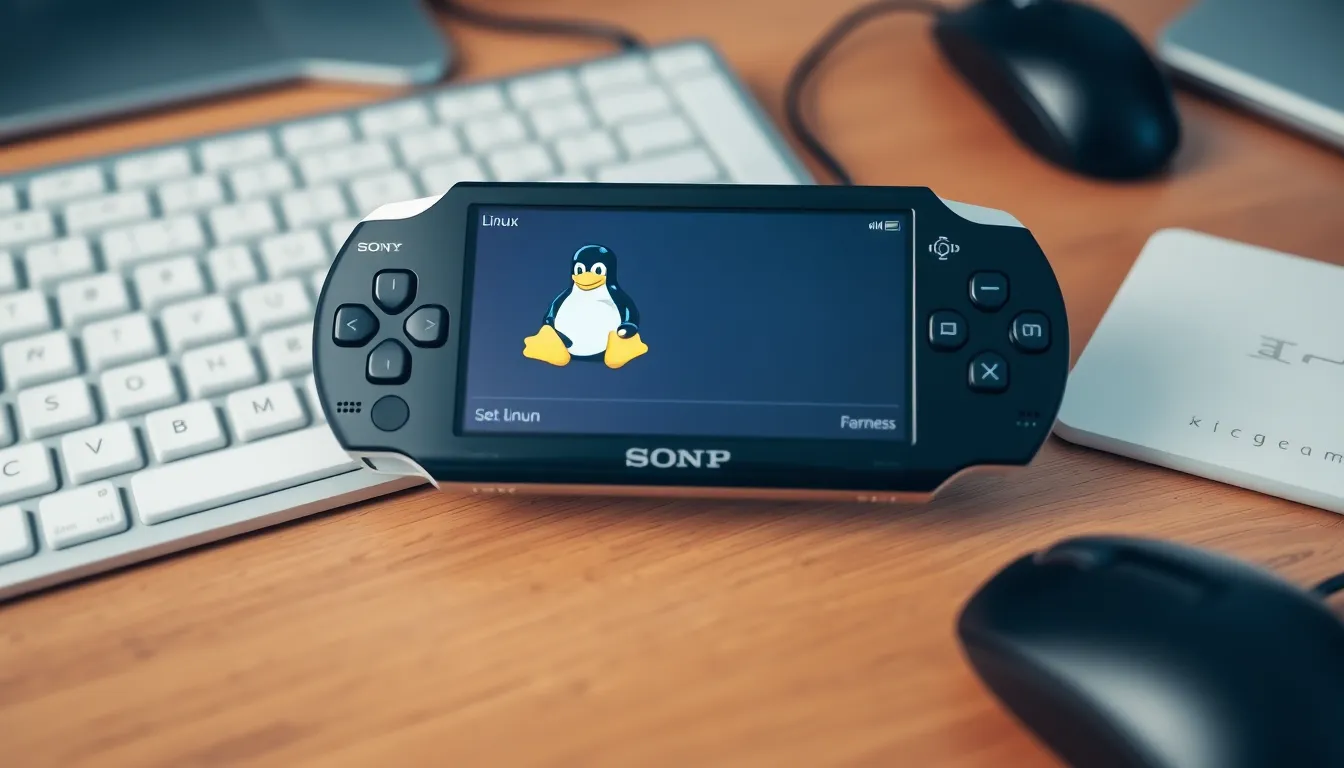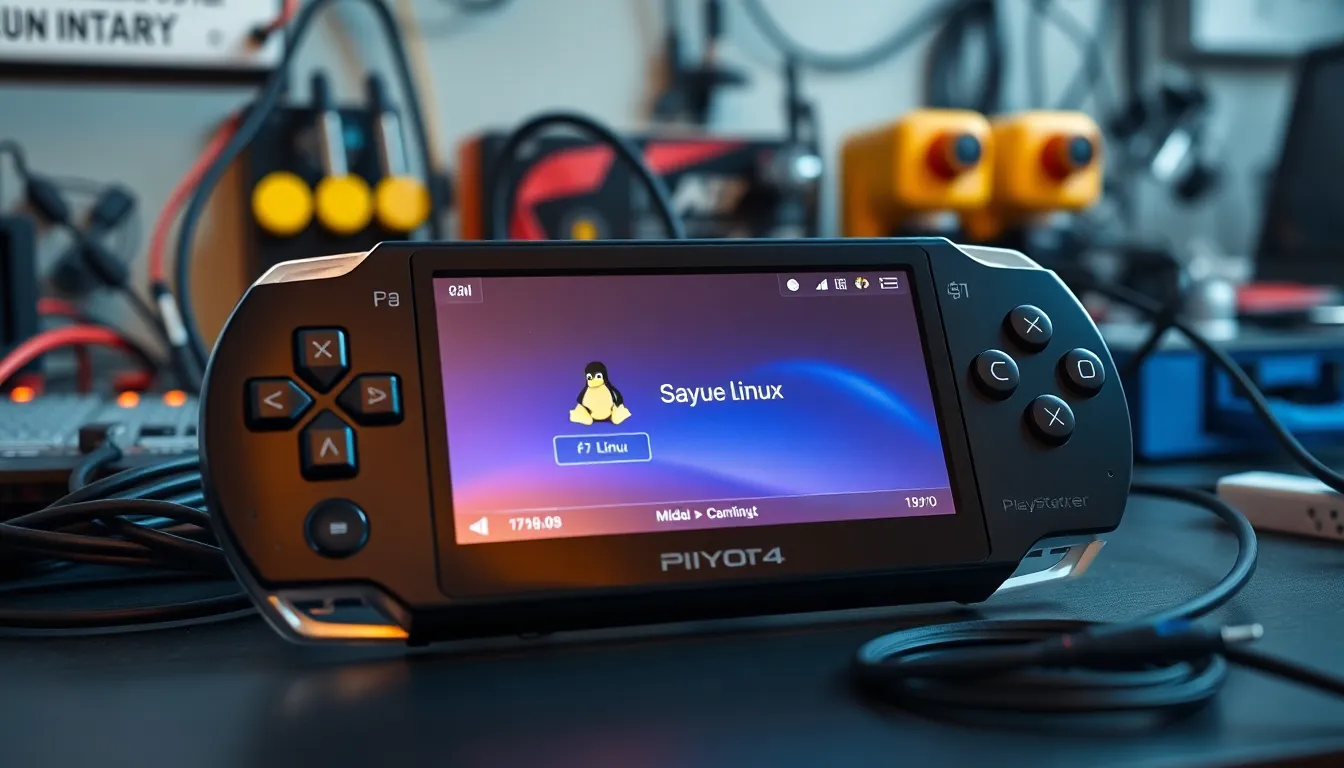Imagine turning your PlayStation Portable into a mini Linux powerhouse. Sounds wild, right? The PSP Linux port does just that, transforming gaming nostalgia into a tech-savvy adventure. It’s not just about reliving those epic gaming moments; it’s about unlocking a world where gaming meets open-source magic.
With this port, users can dive into a universe of customizations, applications, and even coding. Who knew your handheld console could double as a Linux machine? Whether you’re a seasoned developer or just a curious gamer, the PSP Linux port offers a unique blend of fun and functionality. So grab your PSP and get ready to unleash its hidden potential—because why should desktops have all the fun?
Table of Contents
ToggleOverview of PSP Linux Port
PSP Linux Port enables the transformation of the PlayStation Portable into a functioning Linux device. Through this port, users access numerous applications and tools, expanding the device’s capabilities beyond gaming. This system supports customizations that cater to tech enthusiasts and developers alike.
The Linux kernel allows for a variety of distributions designed specifically for the PSP. Popular distributions include Open Source PSP Linux and SceLibc, which enhance the user experience with better performance and flexibility. Developers appreciate the available software libraries that simplify the coding process for new applications on the PSP.
Accessibility stands out as a key feature of the PSP Linux port. Users can easily install and run different programs designed for Linux operating systems. Such flexibility invites a wider range of functionalities, from simple command-line utilities to graphical user interface applications.
Community support plays an essential role in the development of the PSP Linux environment. Forums and online resources populate the landscape, providing assistance and sharing knowledge among users. By actively participating in these communities, individuals can discover new projects and collaborate with others who share their passion for the platform.
Security remains critical when using Linux on a portable device. Regular updates and patches from community contributors help mitigate vulnerabilities. Users maintain the integrity of their systems by monitoring and applying these updates.
Overall, the PSP Linux port presents a unique opportunity for exploration and innovation. It encourages users to leverage their devices in creative ways, transforming a gaming console into a versatile computing tool.
Features of PSP Linux Port

The PSP Linux port offers several noteworthy features that enhance the utility of the handheld console. Users can look forward to diverse functionalities, making it a compelling option for tech enthusiasts.
System Compatibility
Compatibility stands as a key feature of the PSP Linux port. It supports various Linux distributions, including Open Source PSP Linux and SceLibc. Users enjoy the ability to run a wide range of applications without encountering extensive hardware restrictions. Custom kernels also provide options for enhanced performance. Programs designed for Linux run smoothly on the device, expanding its usage far beyond gaming. Additional drivers enhance peripheral support, allowing for keyboard and mouse usage.
Performance Metrics
Performance metrics reflect the capabilities of the PSP Linux port. Speed optimizations significantly enhance the efficiency of running applications. Memory usage remains within acceptable limits, allowing users to operate multiple programs simultaneously. Benchmark tests reveal that the port delivers reliable responsiveness, contributing to a satisfactory user experience. Regular updates ensure ongoing improvements, addressing bugs and enhancing functionalities. Developers continue to refine performance, making the port increasingly versatile and user-friendly.
Installation Process
Installing the PSP Linux port requires some preliminary steps and specific instructions. This process enables users to fully utilize the PSP’s potential beyond gaming functions.
Prerequisites
Users must ensure their PSP runs custom firmware for the Linux port. Accessing the Homebrew Channel or a similar environment is essential. Adequate battery life remains critical; a fully charged battery ensures uninterrupted installation. It’s also important to backup existing data to prevent loss. Lastly, familiarity with basic Linux commands assists in navigating the installation process.
Step-by-Step Guide
Begin by downloading the appropriate PSP Linux port files from a trusted source. Transfer these files to the root directory of the PSP’s memory stick. Next, navigate to the Games menu on the PSP and select the Linux installer. Follow on-screen prompts to complete the installation process. Users should reboot their devices to access the Linux environment. Once set up, installing additional applications can enhance functionality. Regular maintenance, such as checking for updates, ensures optimal performance and security.
User Experience
The PSP Linux port enhances the user experience by transforming the PlayStation Portable into a versatile Linux device. This transformation opens up a range of functionalities that extend beyond traditional gaming.
Benefits of Using PSP Linux Port
Access to diverse applications stands as a primary benefit of the PSP Linux port. Users can run command-line utilities and graphical applications seamlessly. The ability to customize the interface adds another layer of flexibility, allowing for personal preferences in usage. Improved performance metrics, including faster processing times and efficient memory use, enhance multitasking capabilities. Running multiple applications simultaneously becomes feasible, thanks to regular updates that optimize system resources. Community engagement fosters sharing of innovative projects and solutions, enriching the overall user experience.
Common Issues and Troubleshooting
Users might encounter various issues during their journey with the PSP Linux port. Installation problems can arise from incorrect file transfers or outdated firmware. To troubleshoot, verifying the firmware version ensures compatibility with the Linux port is crucial. Performance lags may result from inadequate memory allocation. Users should monitor running applications and consider closing unneeded programs. Connectivity issues can also occur when attempting to access network resources. Restarting the device or adjusting settings usually resolves these concerns. Utilizing community forums often provides effective solutions and support, enhancing problem-solving experience.
Future of PSP Linux Port
Future developments for the PSP Linux port focus on enhancing compatibility and performance. Community-driven projects aim to introduce newer distributions, improving user experience. Ongoing contributions from developers are essential to ensure that the port remains relevant amid evolving technology.
Updates planned for the coming months include optimizations for better hardware utilization. Performance enhancements target multitasking capabilities directly, addressing user demands for speed and efficiency. As advancements in software emerge, the PSP Linux port adapts, providing access to updated applications that may not have previously been supported.
User engagement plays a vital role in shaping the port’s trajectory. Resources available on community forums enable collaborative problem-solving and knowledge sharing, fostering growth within the user base. Feedback from users directly influences feature requests and bug fixes, making it crucial for the continual improvement of the port.
Networking functionalities are expected to expand. Future iterations may integrate new communication protocols, enhancing remote access capabilities and broadening application use cases. Such changes reflect the dynamic nature of the community, welcoming innovations that align with user needs.
Security updates remain a priority as the landscape changes. Developers emphasize implementing robust measures to address vulnerabilities, safeguarding users against potential threats. Regular patches ensure system integrity, allowing users to explore their PSP Linux ports without compromising safety.
Ongoing work on custom kernel development is anticipated. This effort will further enhance compatibility with peripherals, such as external drives and webcams. By supporting a diverse array of devices, the PSP Linux port positions itself as a versatile tool for both casual users and tech enthusiasts.
Overall, the future of PSP Linux port promises continuous innovations driven by a passionate community.
The PSP Linux port stands as a testament to the creativity and ingenuity of the gaming community. By transforming the PlayStation Portable into a multifunctional Linux device, users can unlock a world of possibilities that go beyond gaming. With its growing support and regular updates, this port not only enhances user experience but also fosters a collaborative environment for developers and enthusiasts alike.
As the community continues to innovate, the PSP Linux port is poised for exciting advancements. Users can look forward to improved performance and expanded functionalities that cater to their diverse needs. Embracing this tech-savvy adventure not only enriches the handheld experience but also keeps the spirit of exploration alive in the gaming world.




